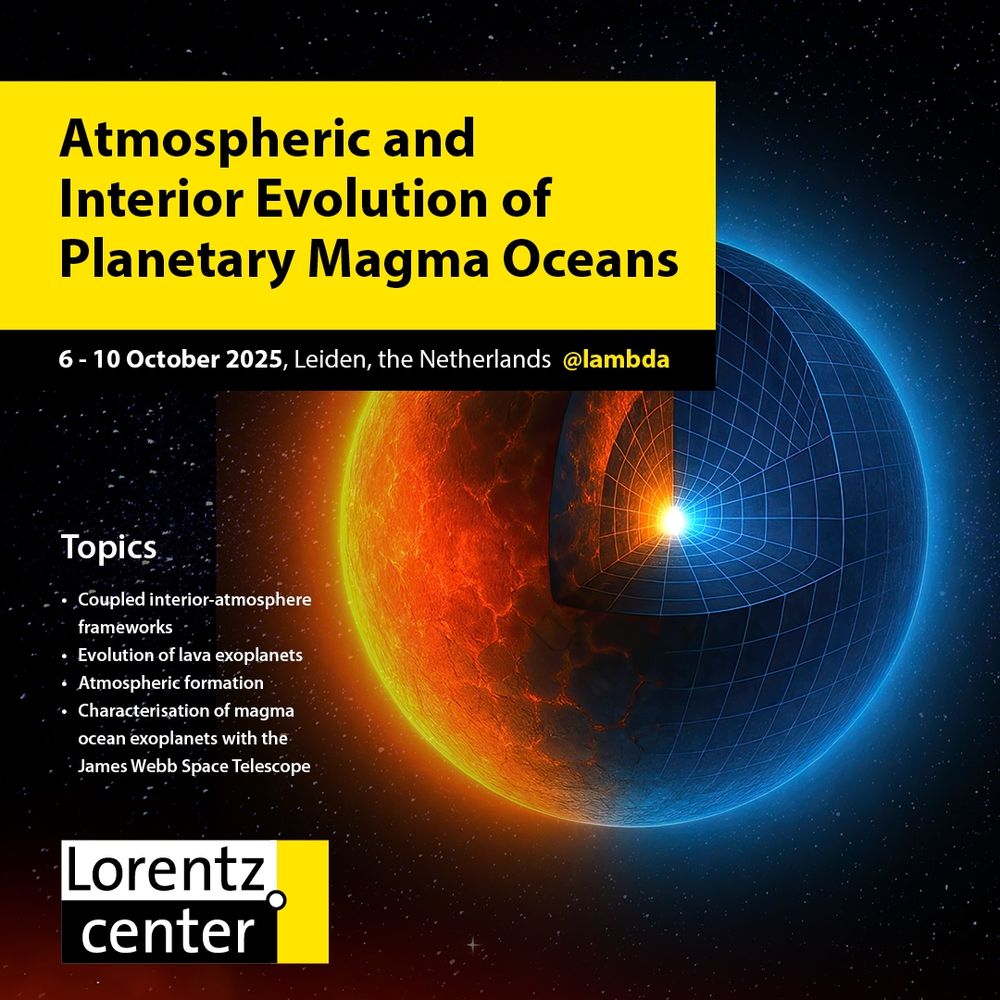
astrobites.org/2025/10/31/a...

astrobites.org/2025/10/31/a...
🧵

🧵
PhD positions:
aas.org/jobregister/...
Postdoctoral positions:
aas.org/jobregister/...
#exoplanet #astronomy #geoscience 🧪🔭⭐
[Image credit: Mark A. Garlick.]

PhD positions:
aas.org/jobregister/...
Postdoctoral positions:
aas.org/jobregister/...
#exoplanet #astronomy #geoscience 🧪🔭⭐
[Image credit: Mark A. Garlick.]

www.science.org/doi/10.1126/...

www.science.org/doi/10.1126/...
@timlichtenberg.bsky.social @lavainspace.bsky.social @astroyami.bsky.social @meteodenny.bsky.social

@timlichtenberg.bsky.social @lavainspace.bsky.social @astroyami.bsky.social @meteodenny.bsky.social
13:00 UTC = 15:00 CEST = 09:00 EDT = 06:00 PDT = 22:00 JST
If you haven't signed up to our mailing list to access the Zoom-link, you can also watch it live on our YouTube channel 🔭☄️🧪 #exoplanet livestream: www.youtube.com/watch?v=nMr2...
Next #RockyWorldsDiscussion on Thu 2 Oct @ 13:00 UTC will feature Kazumasa Ohno (NAOJ) and recent JWST results that lift the hazy veil on the composition of sub-Neptune #exoplanet GJ 1214 b 🪐🔭🧪
More: www.rockyworlds.org/event-detail...


13:00 UTC = 15:00 CEST = 09:00 EDT = 06:00 PDT = 22:00 JST
If you haven't signed up to our mailing list to access the Zoom-link, you can also watch it live on our YouTube channel 🔭☄️🧪 #exoplanet livestream: www.youtube.com/watch?v=nMr2...
Her PhD thesis basically established the Harvard astro department — at a time when Harvard didn't officially allow woman students.
I wrote this little profile to mark the 100th anniversary of her thesis:
Her PhD thesis basically established the Harvard astro department — at a time when Harvard didn't officially allow woman students.
I wrote this little profile to mark the 100th anniversary of her thesis:
TOI-561 b is basically the worst possible place to go looking for an atmosphere: too hot, too small, and too old.
But it looks like someone forgot to tell the planet that. Because it has air, anyways 🧪🔭
Me for @sciam.bsky.social:
TOI-561 b is basically the worst possible place to go looking for an atmosphere: too hot, too small, and too old.
But it looks like someone forgot to tell the planet that. Because it has air, anyways 🧪🔭
Me for @sciam.bsky.social:
TOI-561 b is basically the worst possible place to go looking for an atmosphere: too hot, too small, and too old.
But it looks like someone forgot to tell the planet that. Because it has air, anyways 🧪🔭
Me for @sciam.bsky.social:


What can planetary scientists learn from exoplanet research? Read all about it in our interview with @timlichtenberg.bsky.social
www.europlanet.org/exoplanets-a...
@europlanetmedia.bsky.social
What can planetary scientists learn from exoplanet research? Read all about it in our interview with @timlichtenberg.bsky.social
www.europlanet.org/exoplanets-a...
@europlanetmedia.bsky.social
They are the winners of the Europlanet Career Medals!
🥇 Early-Career Medal Winner, @timlichtenberg.bsky.social
🥇 Mid-Career Medal Winner, Benoit Carry
🥇 Lifetime Achievement Winner, Jean Schnieder
👉 Discover more: www.europlanet.org/tim-lichtenb...



They are the winners of the Europlanet Career Medals!
🥇 Early-Career Medal Winner, @timlichtenberg.bsky.social
🥇 Mid-Career Medal Winner, Benoit Carry
🥇 Lifetime Achievement Winner, Jean Schnieder
👉 Discover more: www.europlanet.org/tim-lichtenb...
Our next speaker is Laura Schaefer from Stanford University, who will tell us about redox gradients in planet formation simulations of terrestrial planets 🌍🌕🪨 Join us on Zoom on Thu 4 Sep @ 16:00 UTC
More: www.rockyworlds.org/event-detail...


Our next speaker is Laura Schaefer from Stanford University, who will tell us about redox gradients in planet formation simulations of terrestrial planets 🌍🌕🪨 Join us on Zoom on Thu 4 Sep @ 16:00 UTC
More: www.rockyworlds.org/event-detail...



postdoc positions into independent scientific leadership, the VIDI has become more of a mid-career consolidation grant.
Read our full analysis and recommendations: ap-net.nl/wp-content/u...

postdoc positions into independent scientific leadership, the VIDI has become more of a mid-career consolidation grant.
Read our full analysis and recommendations: ap-net.nl/wp-content/u...


